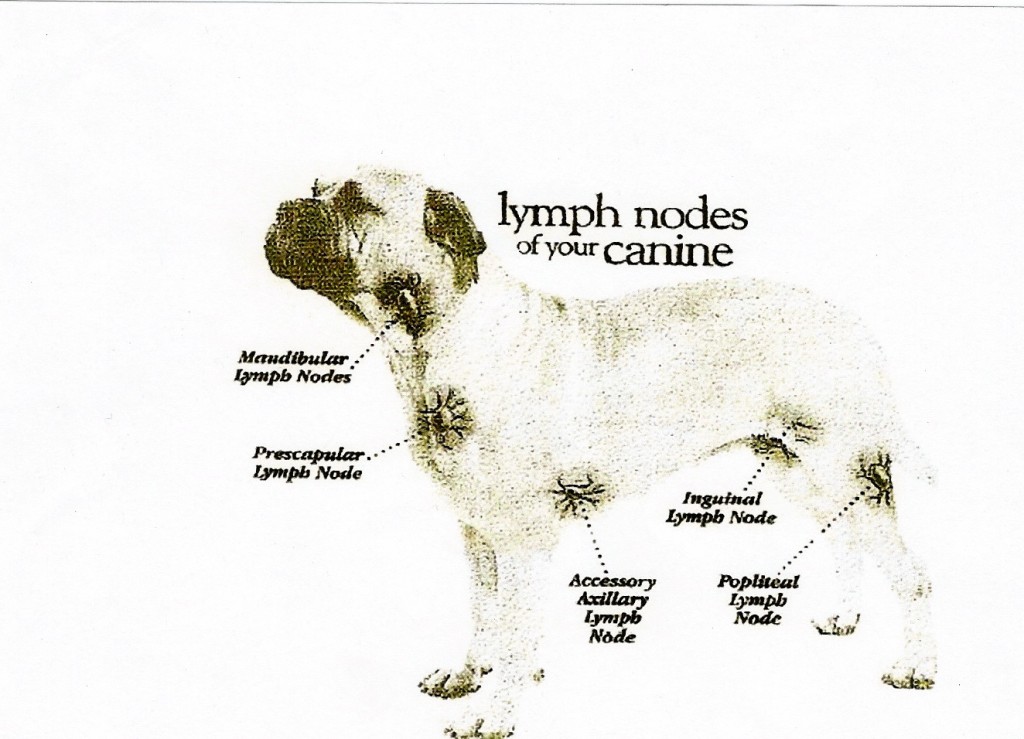Understanding and Successfully Treating Canine Lymphoma
Lymphoma is a term that is used to describe a diverse group of cancers in dogs that are derived from white blood cells called lymphocytes. Lymphocytes normally function as part of the immune system and play an important and integral role in the body’s defenses.
Malignant lymphoma or lymphosarcoma is one of the most common types of cancer tumors found in dogs and accounts for approximately 7-24% of all canine neoplasia (formation of a new tissue) and 83% of all canine hematopoietic (blood cells) malignancies.
Lymphoma tumors usually originate in lymphoid tissues, like the lymph nodes, spleen, and bone marrow, however they can arise in any tissues in the body.
 There are over 30 different types of lymphoma found in dogs, and each type of cancers can vary tremendously in their behavior and.
There are over 30 different types of lymphoma found in dogs, and each type of cancers can vary tremendously in their behavior and.
There are two forms of lymphocytes: B and T cells. Lymphoma may involve neoplastic proliferation of T or B, or non-B/non-T type lymphocytes, occurring primarily in the bone marrow, lymph nodes, and visceral organs. But mostly cases involving B-lymphocytes are seen in dogs.
Lymphosarcoma is classified according to the location in the body in which the cancer begins.
- Multicentric form occurs in the lymph nodes.
- Gastrointestinal form occurs in the stomach, intestines, liver and lymph nodes in the abdomen.
- Mediastinal form occurs in the mediastinum, in front of the heart in an organ called the thymus.
- Hence this form of lymphosarcoma sometimes is called thymic lymphoma.
- Cutaneous form occurs in the skin.
- Acute lymphoblastic leukemia occurs when the disease starts in the bone marrow.
- Miscellaneous forms of lymphosarcoma are less common and include those that begin in the
- Nervous system, nasal cavity or kidneys.
 Studies have shown that highly malignant cases of lymphoma were much higher in dogs that were exposed to lawn herbicides and home insecticides.
Studies have shown that highly malignant cases of lymphoma were much higher in dogs that were exposed to lawn herbicides and home insecticides.
Main Causes for Lymphoma in Dogs
Although there is no conclusive evidence at this point, some studies show that herbicides and pesticides to be a major contributor. Dogs located in more industrial areas are noted to have higher rates, indicating higher levels of chemicals, paints and other toxins to be a factor.
Weakened immune systems have also been noted, which can be a result of improper diet over a period of time.
Diagnosis
If canine lymphoma suspected, a thorough physical examination with a complete blood count with a differential cell count, a platelet count, serum biochemistry profile and urinalysis may be performed. Obtaining tissue or cytologic specimens is essential for a definitive diagnosis.
The blood tests may reveal anemia, abnormally low levels of lymphocytes in the blood (lymphopenia), an abnormally high number of neutrophils (a type of white blood cell) in the blood (neutrophilia), an abnormally high number of monocytes (a type of white blood cell) in the blood, and abnormally low numbers of platelets (cells that are important in blood clotting), a condition called thrombocytopenia. The biochemistry profile may show abnormally high levels of liver enzymes and calcium, a common finding with lymphomas.
More specific testing may be required for a confirmatory diagnosis. Diagnostic imaging, including X-rays and ultrasound, are often used to evaluate the size of regional lymph nodes. Marrow samples can be taken and sent to a pathologist for evaluation and to determine the extent of disease.
Prognosis
Unfortunately long term remission is not common and if remission is accomplished, relapses are common. Chemotherapy is rarely found to have long term success and is main used to improve the quality and extend the dogs of life.
With chemotherapy treatments, total remission is approximately 60-90% of cases with a median survival time of 6-12 months. Approximately 25% of dogs live more than 2 years after the initial treatment.
Canine Lymphoma Symptoms
Symptoms may vary depending upon the location and stage of tumor, but the following are some of the more common symptoms.
- Lack of appetite
- Swollen glands (lymph nodes)
- Weakness
- Lethargy
- Weight loss
- Vomiting
- Diarrhea

A cancer treatment diet is extremely important when treating lymphoma in dogs, due to the nature of how the blood cells are affected and the high rate of relapse.
There are herbs and supplements that can assist in boosting the immune system and aiding cellular development while inhibiting the spread of cancer.

Many cancer fighting herbs can be found online. Starwest Botanicals offers a wide variety of high quality products. In my experience, I’ve found them to be a good company with fast and reliable shipping. www.starwest-botanicals.com.

Conventional Treatments for Lymphoma in Dogs
Because of the different types of Lymphoma in dogs and the many areas where it can develope, conventional protocols can vary greatly. Chemotherapy is a common treatment used, and occasionally can be in combination with surgical removal.
Unfortunately, unless complete surgical removal is possible (which is rare) complete remission in considered rare. In addition, even if remission is attained, a re-lapse is likely.
Conventional treatments are essentially administered to simply extend the dog’s life a little longer while easing some of the symptoms. Certain drugs such as Doxyrubicin are sometimes used and have been to shown to increase the length of survival.
Conventional diagnostics are considered to be very accurate in assessing the type, location and stage of lymphoma, but conventional treatments by themself are not considered very promising for long term success.
You can go to http://wearethecure.org/learn-more-about-canince-cancer/canine-cancer-library/lymphoma/ for more detailed information on the different drugs and procedures used on the different types of Lymphoma in dogs.
Holistic Treatments for Lymphoma in Dogs
Holistic Veterinarians and health practitioners seem to have a little better understanding of the philosophy “treat the patient not just the disease”. They tend take into account the unique circumstances of that particular dog, as well as what’s leading to the illness or disease.
A tumor or any disease is the result of an underlying issue (the cause). That issue needs to be addressed in order achieve and maintain remission. This along with promoting the body’s ability to heal itself, are the main aspects of holistic approaches.
It’s important to understand that many conventional treatments do have some undeniable benefits, but they also have their limitations. To fully realize their potential, they must combined with a holistic approach that promotes health as well. Otherwise, the initial cause and the bodies ability to heal itself are constantly working against the treatment.
The body has a remarkable ability to heal itself. In fact, it’s only the body and the immune system that can heal itself. This fundamental aspect of nature must be recognized and honored by promoting its ability to heal. Only then do we have the highest chance at attaining and maintaining remission.
When treating lymphoma in dogs, the proper diet with powerful immune boosting herbs and cancer fighting supplements are extremely important as this type of cancer has such a low remission rate and high rate of relapse. So it’s imperative to address and alleviate the underlying causes, while promoting cell recovery.
Just as the improper diet can cause complications that help lead to disease, a holistic cancer diet treatment can work to help reverse those issues.There has been some cases where canine lymphoma has been slowed down and even gone into remission, but with many types of cancer, it’s hard to find a case of a dog beating the odds, where diet wasn’t a main component.
Is it a Case of Faulty Genes?
In the vast majority of cases, absolutely not. Some types of cancer are more common it certain breeds, and Boxers, Golden Retrievers, Saint Bernards, Basset Hounds, Airedale Terriers, Scottish terriers, and bulldogs seem to be more predisposed. However, it’s important to understand that predisposed does not mean predetermined! Genetics are a factor, but there are many other factors as well.
For cancer, or any disease to develop, a dysfunction in the immune system must be present. So by addressing this area, we can greatly reduce illness and disease regardless of what genetic challenges a certain breed has.
All that being said, when a breed is more predisposed, this simply means that when something is challenging the immune system, this is the weakest link that we often find the effects first.
Many dogs have these same “weak links” and go on to live a healthy full lives, while some unfortunately do not. Genes are merely blueprints, and it’s how well these these blueprints are properly built upon and maintained that makes the difference.
External factors such as dietary complications and toxins are a main factor in affecting the digestive tract and immune system, which are directly linked. This intern allows for the cells to be altered and diseases such as cancer to develop.




